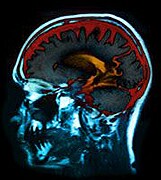
WEDNESDAY, June 10, 2015 (HealthDay News) — Physical and mental activity don’t appear to prevent the brain from developing the telltale beta-amyloid deposits that are a hallmark of Alzheimer’s disease, a new study suggests.
“While it was hoped that early, or current, engagement in these sorts of activity would be protective against developing Alzheimer’s, our findings suggest that, while beneficial for overall mental health, the activity does not seem to prevent amyloid buildup,” said lead researcher Dr. Keith Johnson. He is co-director of the Neuroimaging Core at the Massachusetts Alzheimer’s Disease Research Center and a professor of radiology at Harvard Medical School in Boston.
The report was published June 10 online in the journal Neurology.
Alzheimer’s disease is a type of dementia that causes progressive problems in thinking and memory. The exact cause of the disease remains elusive, but scientists do know that people with Alzheimer’s have what’s known as plaques and tangles in their brains. The plaques form when beta-amyloid protein deposits clump together.
Physical activities — such as bike riding, dancing, walking and gardening — and mentally stimulating activities — such as crossword puzzles and reading — have been shown in other research to reduce the risk of developing Alzheimer’s disease, according to the study authors.
For this study, Johnson and his colleagues collected data on the current and lifetime physical and mental activity of almost 200 people who didn’t have any memory or thinking problems. Their average age was 74.
People in the study had PET and MRI scans so researchers could gauge the amount of beta-amyloid deposits in their brains.
The scans also measured the brain’s metabolism and whether the part of the brain called the hippocampus was shrinking, another sign of Alzheimer’s disease. In addition, participants took tests to evaluate their thinking and mental skills.
“We found that histories of mental activity were related to overall intelligence and generally to performance on tests of mental performance,” Johnson said.
But, these activities weren’t related to the presence of Alzheimer’s disease markers, such as beta-amyloid deposits in the brain, he said.
In fact, although people who kept their brains busy with stimulating mental activities had higher IQs and better mental performance compared with those who did not often take part in such activities, researchers found no relationship between mental or physical activity and signs of Alzheimer’s disease in the brain.
Johnson acknowledged that the study was limited because it didn’t follow people over a long time to see what changes might occur in the brain. The study also asked people to recall activities they’d done in the past. He said studies that follow people’s activities over a long period are needed to confirm these findings.
Despite the current results, Johnson said that a lifetime of physical and mental activity may help keep the brain sharper with age. He also stressed that these findings should not be taken as a reason to not keep mentally and physically active, since other studies have shown these can benefit the brain.
Dr. Sam Gandy, director of the Center for Cognitive Health at Mount Sinai Hospital in New York City, said that mental function is far more important than amyloid plaque in the brain.
“No one comes in to see a doctor complaining that their head is full of amyloid,” he said.
“The mechanisms underlying the mental benefit of physical and mental activity may well have more to do with how the brain copes with pathology [disease] and less about controlling how much pathology is present,” he said.
It would be nice if physical and mental exercise helped reduce amyloid plaque as well, and some studies find exercise is especially effective in reducing plaque in people with an APOE4 gene mutation (a gene linked to the development of Alzheimer’s disease), Gandy said.
“But mental function is the most important benefit by far,” he said. “People should still exercise and use their brains.”
More information
For more information on Alzheimer’s disease, visit the Alzheimer’s Association.
Copyright © 2026 HealthDay. All rights reserved.

